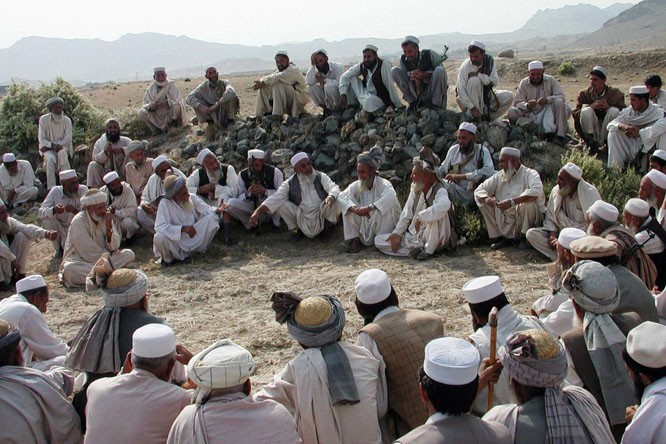
The KPK government’s move to hold local government polls in merged tribal areas is seen as a huge stride in the right direction

The progress on the post-25th Constitutional Amendment and subsequent reforms in the erstwhile Federally Administered Tribal Areas (Fata) has become a classic example of "running to stand still".
The government formed yet another taskforce on September 5 to work out a roadmap for complete integration of the newly-merged tribal districts.
However, the taskforce, as some pertinent quarters fear, should not push the reforms implementation process backwards. In the wake of a few recent instances of smooth transition of some sectors from Fata Secretariat to the provincial administrative departments, certain quarters are advising the government to act as an agent of change and go against the status quo.
The 11-member task force, comprising adviser to prime minister on Establishment Muhammad Shehzad Arbab (Convener), Governor Shah Farman, Chief Minister Mehmood Khan, Federal Minister for Religious Affairs Noorul Haq Qadri, Senator Hidayatullah Khan, Secretary SAFRON Muhammad Aslam, Chief Secretary Khyber Pakhtunkhwa, Additional Chief Secretary Fata (ACS), representatives of military, will further chalk out the merger modalities.
A number of steps have already been taken over the last four months to integrate the erstwhile Fata with the KP. The provincial government has redesignated the political agents as deputy commissioners on June 9. On July 19, the Revenue and Estate Department integrated the British-era seven tribal districts and five sub-divisions into the KP.
However, the major hangover of the Musharraf’s era -- Fata Secretariat -- that was established in 2004 through a notification by the Ministry of State and Frontier Regions (SAFRON) still exists, although without of any legal cover. The ACS Fata Secretariat is still the principal accounting officer and administrative head of the erstwhile Fata as the SAFRON notification still sands.
Prior to the establishment of the Fata Secretariat, separate cells were in place in the provincial line departments and directorates to carry out the administrative and other related functions in the Fata until 2000.
An administrative secretary told TNS that the services of all sectors would be returned to the provincial civil secretariat and line departments on the pattern of pre-2000 setup. "The delay in the merger implementation plan is causing administrative as well as other serious issues. Allocation of development funds is no more possible and only current budget for the first quarter of the current fiscal has been released while development activities in the former tribal belt have come to a grinding halt."
The secretary also referred to a recently issued notification saying that when the health department found it difficult to deal with the dengue issue in the erstwhile tribal areas and the matter figured at the cabinet meeting, the chief secretary on the directive of the chief minister repatriated all the official business regarding the health sector to the provincial heath secretary through a "simple notification" on September 3. "It means there is absolutely no issue in the KP-Fata integration," he asserted.
The government is also working on one of the Sartaj Aziz Committee’s recommendations to grant provincial representation to the people of Fata and delimitation of constituencies for the provincial assembly in the areas has already been started.
Secretary Administration and Infrastructure Coordination, Fata Secretariat, Mian Muhammad confirmed preparations for the party-based local government elections in the former Fata have been initiated.
"We have sent a letter to the secretary Election Commission of Pakistan on September 13 requesting him for delimitation of the constituencies of the local governments (LGs) in the erstwhile tribal areas," he said. "The government attaches high priority to the local government elections in the former Fata (merged districts)."
The secretary admin continued that under the 2002 Local Bodies Elections Order, as many as 296 union councils, including those in the Frontier Regions, had been notified in the erstwhile tribal areas.
A total of 19 tehsils, including Khuwezai/Baizai, were also notified in the former Fata. Besides, 16 municipal committees were notified, and Parachinar and Sadda in Kurram district, Miranshah in North Waziristan and Khar in Bajaur are still functional.
The holding of the LG elections in former tribal areas will now require updating of the electoral rolls and delimitation of the constituencies in accordance with the new census.
The Fata Secretariat has preliminary proposed two-tier LG system for the newly-merged districts -- the district and tehsil tiers.
As put in the UNDP report launched a few days ago in collaboration with Fata Research Centre, University of Peshawar (UoP), the local bodies system has been envisaged as a first step towards introducing the political process in Fata at the grassroots level. "The local government system is important for the region since it will engage the local population to make an inclusive system with the support and trust of the tribal people. Ordinary tribesmen of Fata are in favour of the establishment of local bodies system in Fata."
The Fata Research Centre, in its poll survey conducted in 2016, found out that majority of the people in Fata considered local bodies as the best representative system that can adequately address their daily issues.
Professor Taj Mohammad, Dean Social Sciences, UoP, stated that local representatives would have a better idea of the local problems and local sensitivities. "That’s why the system could bring better changes in the tribal areas according to the local needs and aspirations."
"The major drivers of instability in Fata are corruption and bad governance. The issue of bad governance can be improved by more democratic processes such as the local government. Giving them rights and holding local government elections in Fata will greatly help in empowering the local people," the UNDP report says.
Despite the local readiness and broader consensus on introducing the local bodies system in Fata, the process had been delayed in the past. The government’s move to hold these polls now is seen as a huge stride in the right direction.